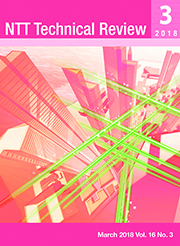
You need Adobe Reader 7.0 or later in order to read PDF files on this site.
If Adobe Reader is not installed on your computer, click the button below and go to the download site.

|

Feature Articles: Research and Development in Sports Brain Science
-
 Understanding and Shaping the Athlete”Ēs Brain”½NTT Sports Brain Science Project”½ Understanding and Shaping the Athlete”Ēs Brain”½NTT Sports Brain Science Project”½

Abstract
In sports, a variety of brain functions hold the key to winning, such as grasping current conditions, strategizing against one”Ēs opponent, and making instantaneous decisions under pressure. Most of these functions, however, are implicit brain functions that the athlete is not even aware of. The NTT Sports Brain Science project was established in January 2017 to conduct research with the aim of understanding superior implicit brain functions in top athletes, identifying the factors in winning, and improving the performance of athletes based on research findings.
-
 Sports Brain Laboratory for Measuring Athletic Competence and Performance Sports Brain Laboratory for Measuring Athletic Competence and Performance

Abstract
Collaboration with athletes is essential for carrying out the Sports Brain Science project, a recent NTT initiative. This project aims to create novel insights into human science as well as to enhance athletic performance and thus benefit both researchers and athletes. The project is introduced in this article, focusing on the research facilities.
-
 Timing Adjustment of Baseball Batters Determined from Motion Analysis of Batting Timing Adjustment of Baseball Batters Determined from Motion Analysis of Batting

Abstract
It takes only 500 ms for a baseball to reach the batter after it leaves the hand of the pitcher. We at NTT Communication Science Laboratories set ourselves the task of figuring out how information is processed in the mind of skilled hitters, enabling them to respond and hit the baseball within this extraordinarily brief interval of time. Here, we explore the information processing time structure in the brain of a batter using motion analysis technology during actual pitcher-batter match-ups.
-
 Virtual Reality-based Sports Training System and Its Application to Baseball Virtual Reality-based Sports Training System and Its Application to Baseball

Abstract
This article introduces a system we are developing that provides a first-person-view experience to users. It is aimed at preparing athletes to engage in sports competitions by enabling them to experience game situations from their own point of view before the game. The use of video has rapidly become popular in the sports field in various ways such as for scouting the opposing team before the game. Such videos are usually captured from a position different from that of players while they are playing the game. Thus, they cannot simulate the game very well. Our system provides a virtual reality-based first-person-view experience by using information captured or measured from locations that will not disturb the game. We describe in this article how our system worked in a trial with a professional baseball team.
Regular Articles-
 Branched Optical Fiber Loss Measurement Technology for End-to-end Testing in Optical Access Networks Branched Optical Fiber Loss Measurement Technology for End-to-end Testing in Optical Access Networks

Abstract
We have developed branched optical fiber loss measurement technology that enables us to measure branched fiber sections beyond optical splitters from a central office without entering the customer”Ēs premises. This article provides an overview of the developed technology and its application to the operation and maintenance of optical access networks.
-
 High Precision 12-single-mode-fiber Multi-fiber Push-on Connector for Reference Use in Connector Inspection High Precision 12-single-mode-fiber Multi-fiber Push-on Connector for Reference Use in Connector Inspection

Abstract
The data transfer speed between data communication equipment in datacenters has been increasing in recent years, and the use of multi-fiber optical links for the communication wiring in such buildings is expanding. In particular, the 12-fiber multi-fiber push-on (MPO) connector for single-mode fiber is expected to be widely used in the future, but an accurate evaluation method is necessary for its proper procurement. We introduce the high precision 12-fiber MPO connector developed as a reference for MPO connector evaluation.
Global Standardization Activities-
 Report on 21st Global Standards Collaboration (GSC-21) Report on 21st Global Standards Collaboration (GSC-21)

Abstract
The 21st Global Standards Collaboration (GSC-21) was held in Vienna, Austria, on September 26 and 27, 2017. Its purpose is to enable standards developing organizations (SDOs) to share information about the activities of the respective organizations and to accelerate standardization activities by avoiding duplication. Seventy-six delegates from 11 SDOs attended the meeting and discussed two strategic topics: artificial intelligence and smart cities.
External Awards/Papers Published in Technical Journals and Conference Proceedings
|
